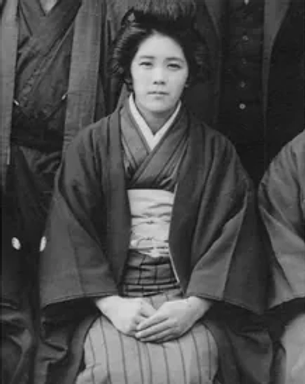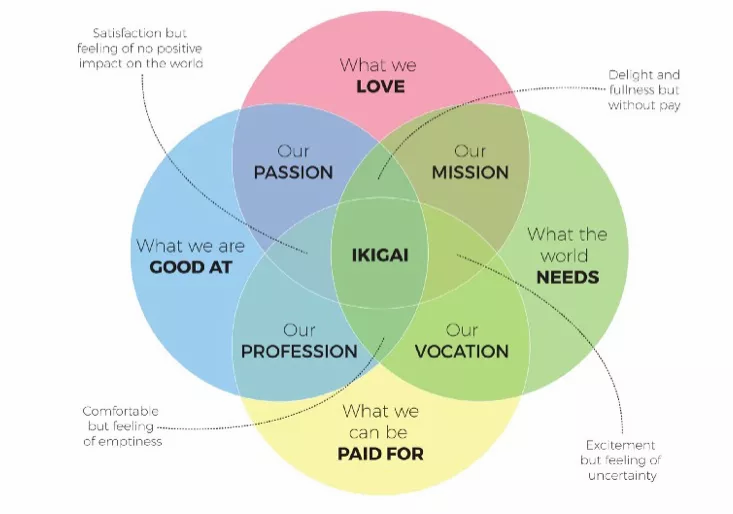By Sonia Jackson, SPCC, Executive Career Coach

Nowhere in the world do people live longer than in Japan. The oldest person on record is Kane Tanake who will carry the Olympic Torch this May at a mere118 years old (pictured aged 23). Okinawa, the islands in the south of Japan, boast the highest number of centenarians on the planet. Twenty-eight percent of the Japanese population is over 65 years old. So why is this? Is it down to ikigai, the age-old Japanese ideology that has long been associated with longevity in Japan? Made up of the Japanese words ’iki’ (生き) life, and ‘gai’ (甲斐) value or worth, ikigai is about finding joy in life through purpose. Ikigai sits somewhere between self-fulfillment and the common good. It’s not linked to social success or ambition, but to the passion of a subject, the love of simple everyday things, the attention and detail of a precise moment, the need to live for the here and now and savour one's reality. It’s the feeling of waking up raring to go each day. According to the Japanese we all have one - or even several - ikigai, but most of us are not even fully aware of it. Finding that ikigai is a fundamental pre-requisite of life and the journey itself is the learning and discovery of oneself. The origin of the word is believed to go way back to the Heian period (794 to 1185). In 2001 clinical psychologist and master of the ikigai evolution Akihiro Hasegawa released a research paper where he wrote that the word ‘gai’ comes from the word ‘kai’ which translates to ‘shell’ in Japanese with the origin being traced back to the Okinawan islands where shells were valued during the Heian period, hence the word value is still associated with the word shell. Extend this and the word hatarakigai means the value of work, and yarigai, ‘being worth doing something’, with ‘gai’ being the key to finding a purpose or value in life. In their work "Ikigai, the Japanese secret to a long and happy life", Hector García and Francesco Miralles link the ikigai and self-discovery of purpose, to other key Japanese philosophies. Staying active, not overeating, surrounding oneself with deep friendships, smiling, connecting with nature, or thanking your ancestors are just a few tips to reconnect with yourself, others, and your environment. And - as a result - to live longer. In 2017, a Japanese TV show Takeshi no katei no igaku joined forces with a team of scientists to research a community near Kyoto which prides itself in having three times moreover 100s than the rest of the country. The study followed seven men and women in their late 90s and early 100s from morning till night, with regular health checks and blood tests. What was found was consistent in the group - an exceptionally high level of steroid hormone (DHEA) secreted by the adrenal glands commonly believed to be the hormone for longevity. More interestingly there was one thing they all had in common – a deep commitment to a hobby. Some carved traditional masks, another painted, one spent his day fishing – hobbies that were practiced daily. This focus and attention to detail, coupled with mild weather, a healthy diet, low stress levels, and a non-retiring population leads to residents living longer be it in Kyoto, Okinawa, Sardinia, or Greece. As with other parts of the world, the skills of craftsmen in Japan are passed on from generation to generation, reflecting the immense value placed on devoting one's life to a single craft. Families often become synonymous with the products they created – take the knife families at Kapebashi in Tokyo where years of collective experience can be traced back to the 16th century; or the sushi chefs working 7-days a week, or the specialist restaurants all over Japan where grandparents still serve customers on a daily basis, and the perfection-honed craft-makers of lacquerware, ceramic, and wood. Keeping interested, focused, and having daily satisfaction in achievements may well be the key to a longer and happier life. And as an increasing number of retirees retrain as security guards, shop attendants, and museum guides, it is no wonder Japan’s older generation has found its ikigai. But ikigai is not just for the elderly. Japan’s younger population looking for more meaning in their lives is adopting the word ikigai, states Hector Garcia. With the economic downturn opening new opportunities, younger workers are free to seek out their ikigai in new roles, combining their skills with less conventional roles in start-ups, and in Japan co-working spaces are flourishing. We all need to find our ikigai so refocusing our mind and purpose. A deep dive into values, strengths and weakness, loves and hates will quickly bring out what makes you feel alive, valued and successful. Combine this with a job that touches all these points and you’ll be living to your ikigai. It’s the most rewarding part of my coaching - by overlapping four key qualities: what you love doing, what you are good at, what has meaning to you, and what you can be paid for, the crossover is the point where the ikigai stands.

Now is the time to look at your career and the meaning in your life. “I haven’t felt this alive in two years,” said a high-flying product manager at a multi-national in Tokyo on our second coaching session. Get in touch. I'll help you find your ikigai. --------- Sonia Jackson is a sought-after executive coach, entrepreneur and writer leveraging her senior corporate experience at National Geographic, News Corporation and Unilever in Europe, Asia and Latin America to help businesswomen reach their fullest potential. She is a Board Member of the Royal GeographicalSociety Asia and the Shibuya International Rugby Club Japan, an Advisor to the Board at the British School of Tokyo, Japan and a Team GB Olympic Ambassador. Sonia is a Senior Professional Career Coach through the International Association of Career Coaches. Contact Sonia LinkedIn soniajackson@irocodesign.com
